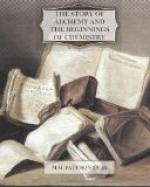How, then, was the transmutation to be accomplished? Evidently by the method whereby nature brings to perfection other living things; for the alchemist’s belief in the simplicity and unity of nature compelled him to regard metals as living things.
Plants are improved by appropriate culture, by digging and enriching the soil, by judicious selection of seed; animals are improved by careful breeding. By similar processes metals will be encouraged and helped towards perfection. The perfect state of gold will not be reached at a bound; it will be gained gradually. Many partial purifications will be needed. As Subtle says in The Alchemist—
’twere
absurd
To think that
nature in the earth bred gold
Perfect in the
instant; something went before,
There must be
remote matter....
Nature doth first
beget the imperfect, then
Proceeds she to
the perfect.
At this stage the alchemical argument becomes very ultra-physical. It may, perhaps, be rendered somewhat as follows:—
Man is the most perfect of animals; in man there is a union of three parts, these are body, soul, and spirit. Metals also may be said to have a body, a soul, and a spirit; there is a specific bodily, or material, form belonging to each metal; there is a metalline soul characteristic of this or that class of metals; there is a spirit, or inner immaterial potency, which is the very essence of all metals.
The soul and spirit of man are clogged by his body. If the spiritual nature is to become the dominating partner, the body must be mortified: the alchemists, of course, used this kind of imagery, and it was very real to them. In like manner the spirit of metals will be laid bare and enabled to exercise its transforming influences, only when the material form of the individual metal has been destroyed. The first thing to do, then, is to strip off and cast aside those properties of metals which appeal to the senses.
“It is necessary to deprive matter of its qualities in order to draw out its soul,” said Stephanus of Alexandria in the 7th century; and in the 17th century Paracelsus said, “Nothing of true value is located in the body of a substance, but in the virtue ... the less there is of body the more in proportion is the virtue.”
But the possession of the soul of metals is not the final stage: mastery of the soul may mean the power of transmuting a metal into another like itself; it will not suffice for the great transmutation, for in that process a metal becomes gold, the one and only perfect metal. Hence the soul also must be removed, in order that the spirit, the essence, the kernel, may be obtained.




